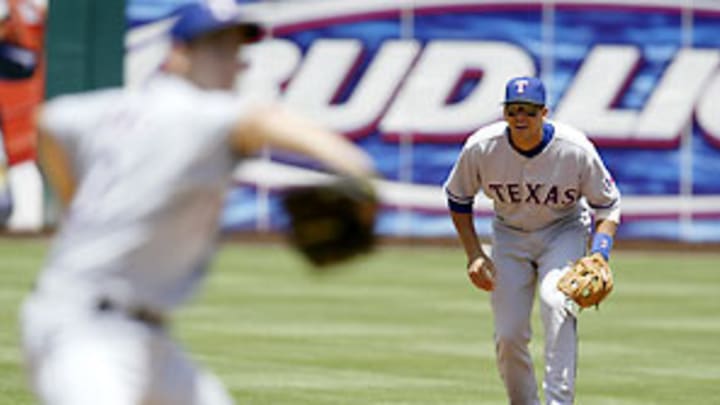Details on A-Rod's alleged pitch-tipping scheme in Texas

SI.com: The book claims that A-Rod tipped opposing players to pitches in the late innings of blowouts, an affront not only to teammates but also to the integrity of the game. How often was this practice performed and how does this affect his standing with his peers?
Selena Roberts: The pitch-tipping was often enough over three years to become a pattern noticeable by the ex-Rangers sources that I spoke to. Only a small number of Rangers knew about the quid pro quo that Alex was involved in and did not want it to spread around the clubhouse because it would have been devastating to the team.
SI.com: How did this pitch-tipping originate?
Selena Roberts: I don't know the history of how it has worked in the major leagues, but from my reporting and the people I spoke with on the Rangers, what they noticed was a pattern of behavior by Alex over a pretty lengthy period of time, two or three years, where it just became more noticeable that his mannerisms on the field were different in games that were already over, its 10-2, something like that. When games were already decided, they noticed this behavior with Alex where he would do very obvious signs, presumably to an opposing hitter who would be a middle infielder on an opposing team, where they believed that he would tip the signs.
SI.com: Why was he doing this?
Roberts: What this was all part of was a quid pro quo, according to the people I spoke with. Alex would tip his middle infielder buddy on the other team and the player on the other team would in turn tip Alex. What it was was slump insurance. You could count on your buddy to help you break out of your slump, if you're 0 for 3 or you've had a bad week. There was no intent to throw a game or change the outcome.
SI.com: How would he tip the pitches?
Roberts: If it was a changeup, sources say, he would twist his glove hand. To indicate a slider, he would allegedly sweep the dirt in front of him, and he would bend in the direction of where the pitch was going to be, inside or outside. I don't know that it's easy to decode. You're talking about people who see a player on an every-day basis, day after day, year after year. I don't know that it would be at all obvious to people who are watching or to a television audience. These are people who would know how to detect when things don't feel right. If it happened once or twice, people might say, Let's give him the benefit of the doubt, maybe we didn't see what we thought we saw. But according to the people that I spoke with, this was a pattern of behavior.
SI.com: So if teammates noticed it, how did they handle it?
Roberts: At least one teammate in a very gentle way did say, "Hey, you might be tipping a little too soon out there." What would usually happen would be for Alex to signal the pitch to his teammates as the pitcher was in the windup; that way the batter is focused on the pitcher and not able to see the sign. However, these signs Alex would flash came before the windup and that made it more noticeable. This is the critical difference between signaling your infield as quarterback and giving away the pitch to the hitter: when you flash the sign. This was done to give the batter plenty of time to see it and figure out what to do about it.
But one player trying to be diplomatic told me that he said, "I think you're tipping a little too soon," and the response from Alex was, "What are you talking about?" I don't think Alex was irritated at the player; I think he felt that he had been scrutinized too closely, that someone else was trying to tell him how to do his job. These people who knew about it or witnessed it knew how it would play in the clubhouse if it became an issue. These were all reasons why it didn't become a bigger deal than it was, because people wanted to keep it under wraps.
SI.com: How many people knew about this?
Roberts: I think it was kept to a very small group of people. The people that are noticing this, it's not something that you want to tell anybody else. You want to keep it to yourself until it becomes something you can't ignore anymore. If this had been a situation where it was determining the outcome of a game, obviously it would have been a much different story.
See also:Keith:A-Rod's ex-teammates react to pitch-tipping reportVerducci:Selig mum on A-Rod for now
